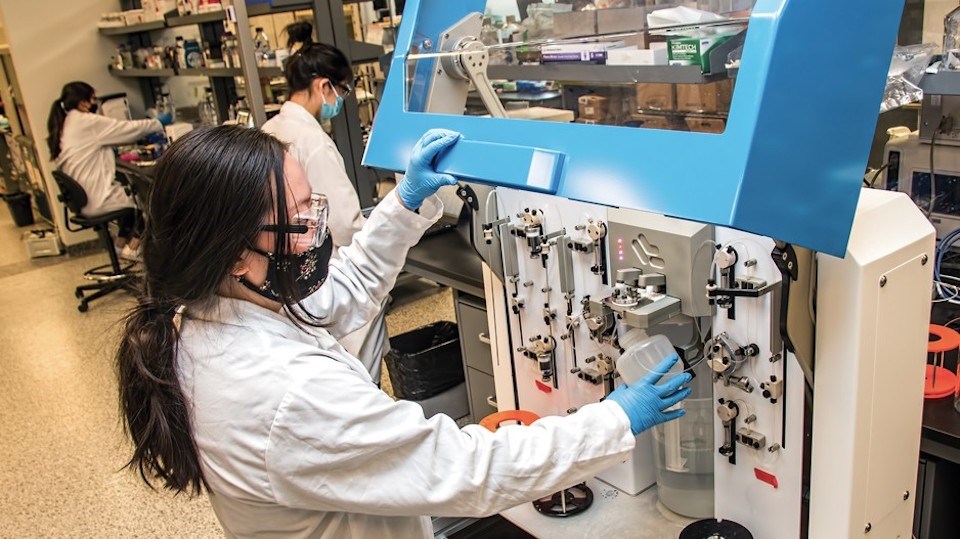A COVID-19 treatment developed in partnership between Vancouver biotech AbCellera Biologics Inc. (Nasdaq:ABCL) and U.S. pharmaceutical giant Eli Lilly and Co. (NYSE:LLY) thrust B.C.’s life science sector into the spotlight much of the past year.
AbCellera went public in December 2020 – reaching unicorn status after its blockbuster IPO raised US$555 million – and soon after unveiled plans to build specialized offices throughout Vancouver as it sought to hire 1,000 workers over the next seven years.
Since then, other American medical giants have taken an increased liking to the West Coast biotech scene, boosting the potential to raise the profile of made-in-B.C. innovations.
“This has opened a lot of doors,” Cytiva vice-president Olivier Loeillot said of the impact his company’s acquisition of B.C. biotech firm Vanrx is having on the latter.
Vanrx is best known for developing robotic machines capable of safely filling vials, syringes and cartridges with liquid drugs.
It was Cytiva’s first acquisition after U.S. medical giant Danaher Corp. (NYSE:DHR) took over GE Life Sciences in 2020 as part of a US$21.4 billion deal. GE Life Sciences subsequently rebranded as Cytiva.
Loeillot said because Cytiva is a supplier to big pharma and small biotechs, the acquisition has “given more credibility to Vanrx because some of our customers have known us for a long, long period of time.”
The Vancouver company’s machines use hydrogen peroxide vapour, robotic components and machine-vision cameras to autonomously inject liquid drugs into items like vials enclosed within a clean environment to ensure all components remain sterile.
Customers have been using the machines for everything from animal tranquilizers and gene therapies to personalized medicines and messenger RNA (mRNA) drugs.
Co-founder and former CEO Chris Procyshyn once compared old-school industry practices to how Homer from The Simpsons completes his tasks at the nuclear plant.
“That’s kind of the status quo for industry, of people from awkward angles and rubber gloves trying to accomplish this,” he told BIV after last year’s acquisition.
Instead, he said Vanrx’s robotics process can be summed up as: “Open them, fill them, close them and complete them, all without the use of humans directly in the process.”
Procyshyn has since left Vanrx, and a new leader is expected to be announced this month.
And after some delays, Loeillot said Cytiva now plans to open Vanrx’s new 113,000-square-foot facility sometime in 2022’s second quarter.
“We’re very excited about it because, beyond being a brand-new facility, this will also enable us to get access to much more capacity and certainly be able to [meet] this incredible demand,” he said, adding that the company has grown its headcount to 200 from about 100 workers since last year’s acquisition.
Further down the road, another 2021 Cytiva acquisition will be opening a new facility in Metro Vancouver.
Plans for Precision NanoSystems Inc.’s (PNI) new $50 million biomanufacturing facility in Vancouver’s False Creek Flats are underway after the federal government revealed last February it was earmarking $25 million for the plant as part of a bid to shore up the country’s domestic vaccine manufacturing capacity.
PNI is best known for producing technology to develop and manufacture genetics medicines that deliver RNA or DNA directly into cells to treat disease at its molecular root cause.
PNI specializes in self-amplifying RNA vaccines, which have the potential to create more potent vaccines as they amplify the signal, allowing PNI to manufacture more doses for less volume.
Moderna Inc. (NYSE:MRNA) and Pfizer Inc. (NYSE:PFE) have been providing the bulk of Canada’s COVID-19 vaccine supply with their own messenger RNA (mRNA) vaccines. PNI’s facility would be able to produce up to 240 million annually of its own self-amplifying RNA vaccine doses – if approved – compared with two million of the mRNA doses.
After Cytiva bought PNI last spring, the company insisted it would still meet its obligations to Ottawa.
“There [were] obligations as part of that award and partnership with the Canadian government. So we’re maintaining those obligations, and now we’ve been able to attract a fantastic partner … to be a part of that as well,” PNI co-founder James Taylor said at the time.
“[The acquisition] really allows us to bring together extremely complementary products and services to better serve our drug development partners and clients, expand our global reach, grow here in Vancouver and enable more drugs to be developed faster.”
His description of the acquisition as an accelerator pedal for the biotech’s ambitions already appears to be bearing out.
Taylor originally estimated the biomanufacturing plant would be completed by March 2023. That timeline has since moved up to 2022’s fourth quarter.
Burnaby-based Symvivo Corp. is also drawing interest from U.S. giants for its advances in COVID-19 vaccines.
While Canadians are familiar with vaccines administered through needles that often require chilled temperatures to remain stable, the B.C. biotech is pursuing the use of live bacteria as a gene-delivery platform. Symvivo is seizing on the healthy probiotic bacteria all humans maintain in their bodies since infanthood and modifying it to deliver genetic material to the body.
This technique has spawned separate collaborations with Merck and Co. Inc. (NYSE:MRK) and Janssen, the pharmaceutical arm of Johnson & Johnson (NYSE:JNJ).
Symvivo’s bacteria would be grown to a certain density, freeze-dried and then formulated into capsules people can swallow at home.
While Symvivo is working on a vaccine that delivers a gene that induces an immune response to the virus that causes COVID-19, founder and CEO Alexander Graves said the company’s platform also works in a turn-key fashion and can be applied to other viruses.
“Vancouver, for us, is a site we’re going to capitalize on,” Loeillot said about Cytiva’s plans for Vanrx. “We almost doubled in size in one year. I think it’s fair to say it’s going to double again, probably in the next three to five years.”



